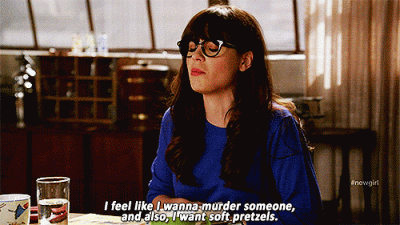I am not someone who is exactly fun to be around if I am really hungry. A lot of times, my mood changes really quickly if I’m hungry. I tend to feel angry, irritable, and anxious until I can finally eat. Food is definitely something that affects my mood. Not only can being hungry affect your mood, but you may not realize that there are certain foods that can boost your mood or worsen it if you are having a bad day.
Why You Become “Hangry”

GIF courtesy of theodysseyonline.com
It’s scientifically proven that being hungry can lead to anger in most people, so don’t worry you’re not alone. In a study published in Proceedings of National Academy of Sciences, it was found that people with lower blood sugar were “more stabby” (they were given voodoo dolls to stab when they were angry). The hungrier people were, the angrier they were.
The study mainly focused on how our bodies are so intertwined and what we feel in our stomachs doesn’t just stay there. It can affect your heart, lungs, brain and even your emotions. When you are hungry, your body tends to go into the fight-or-flight response. So, the next time your family gets annoyed because your lack of food has caused you to be angry for no reason (my dad can’t stand me when I’m like this) tell them it’s scientifically proven and not your fault.
Your food intake can greatly affect your moods, and not just when you are hungry. There are many foods linked to certain emotions as well. If you want to stay in the mood you’re in or not worsen an already bad mood, pay attention to the foods you’re eating and how they affect the rest of your body, including your emotions.
Our Emotional Relationship With Food

GIF courtesy of mamamia.com
Depending on what you eat on a daily basis, the food you consume can affect your metabolism, hormones, and neurotransmitters (mood chemicals that are produced in the brain), and these then influence your emotions, concentration and energy.
In order to keep your metabolism, hormones and neurotransmitters at the right levels, you need to eat proteins, carbohydrates and vitamins, which in turn will keep your emotions balanced.
If you steer away from certain foods that keep everything balanced and instead eat more sugar, alcohol, and caffeine, you could find yourself in a bad mood because these foods bring on an inflammatory response in the nervous system. Your mood could be shifting and depend on what you eat throughout your day.
The More Carbs, the Better

GIF courtesy of tumblr.com
Our ability to stay focused and have enough energy throughout our day comes from blood glucose from food traveling to the brain. Our glucose level is also important in fueling our muscles, especially if you are someone who works out a lot.
This glucose comes from the carbs we eat, including fruit, vegetables, rice, bread, whole grains and legumes. If you don’t eat enough carbs in your routine, then you won’t have enough glucose in your body, which could make you feel weak, tired, and not as happy and ready to tackle your day.
Another chemical, called serotonin, which is known to improve your mood and how you feel, is also found in carbohydrate rich foods you eat as well. The more you eat healthy carbs, the more this chemical can reach your brain and boost your mood.
If you are someone who focuses on a high-protein and high-fat diet, it may lead to low moods because you aren’t getting enough carbs and, as a result, enough serotonin.
And you thought you would never be told to more carbs! But seriously, the more carbs, the happier you could be so eat away, just make sure you try and eat complex carbs which have many benefits.
If you find yourself in a bad mood and just can’t seem to get out of it, try a snack such as whole grain bread with honey. When you focus on consuming more high-carbohydrate foods and less protein and fat, tryptophan, an amino acid, floods your brain. The tryptophan then in turn becomes serotonin, which boosts mood and curbs food cravings. Carbs are great for boosting your mood and thus being your happy self.
Eat Away That Bad Mood

GIF courtesy of rebloggy.com
For all you coffee lovers out there (I’m drinking a cup right now), if you are feeling down and just need an emotional boost, reach for that cup of coffee. Coffee doesn’t work for everyone, but for some the caffeine will get the job done as it blocks a chemical called adenosine, which typically blocks your energy boosting brain chemicals.
The adenosine from coffee will give you a healthy rush if coffee is your friend. But for others, it could leave you feeling jittery more than anything else so be careful of your coffee intake.
However, sometimes that sluggish feeling just can’t be beat, and you might be feeling depressed and can’t fight it. Try eating more fish – the omega-3 fatty acids, found in salmon, herring, sardines, and tuna, can help ease depressive symptoms.
The omega-3 fatty is so effective that in study conducted around bipolar disorder, 11 out of the 14 participants who were given fish oil supplements reported fewer symptoms of depression. If you don’t like fish, you can try fish oil supplements to fight feeling depressed, or even try to incorporate ground flaxseed, hemp and avocado oils, as these foods are also rich in omega-3 fatty acids.
Eat Away That Stress, the Right Way

GIF courtesy of britneyspearsgifs on Tumblr
With the new school year just around the corner, or work taking up all of your time, you might feel like you just can’t calm down and relax. If you are way too stressed out, try eating more magnesium, which is found in foods such as leafy greens and pumpkin seeds.
Magnesium is a calming mineral that is depleted when we are stressed out. For those of you who feel more stressed than usual, try increasing your intake of magnesium-rich foods to help keep you relaxed, especially as your schedule gets more and more hectic. Here are some other foods which help reduce your stress levels.
Of course we all want to be happy, but sometimes life gets in the way. If you want to try and be that happy self you were when summer first started and you had less worries, try foods such as asparagus, beans, peas, egg yolks, spinach, meat, fish or poultry.
These foods contain folate, vitamin B6, and vitamin B12. These B vitamins work to keep homocysteine levels low. If this amino acid that is produced in the body is high, it can cause you to feel blue or even depressed more frequently.
If you just can’t beat back a bad mood or your emotions feel out of whack, make sure you are focusing on what you are eating – you might be missing a key vitamin or mineral in your body. Also, next time your friends gets mad because you’re so hangry, tell them it’s not your fault: it’s science, and you should be fed immediately.


